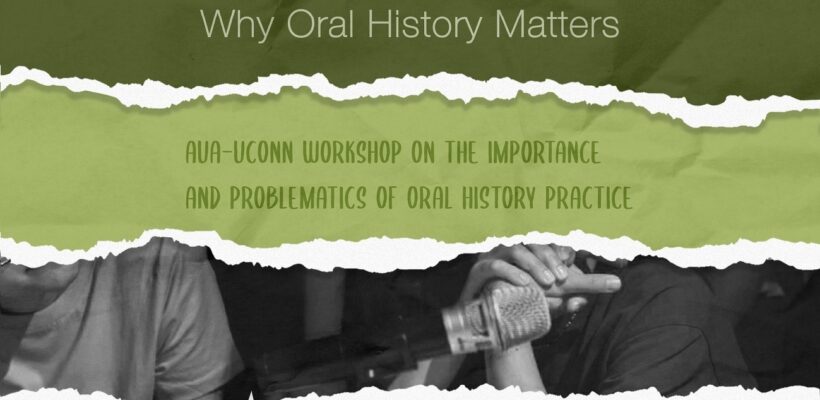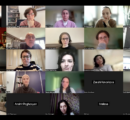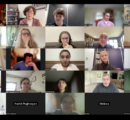
AUA and UConn Discuss Why Oral History Matters
3 min readYEREVAN, Armenia — On April 12, students, faculty, and community members from the American University of Armenia (AUA) and the University of Connecticut (UConn) gathered to share their experiences of conducting and participating in oral history projects.
Following introductory remarks by AUA Assistant Professor Dr. Philippa Mullins, AUA Associate Professor Dr. Hourig Attarian and Catherine Masud from UConn’s Department of Digital Media and Design introduced the students’ work from the AUA and UConn sides, respectively. The event then moved through student-led presentations and discussions, before closing words from Christopher J. Dodd Chair in Human Rights Practice Dr. James Waller of UConn’s Department of Literatures, Cultures, and Languages.
Together, attendees puzzled over questions students posed, anchored in their own practice: how does oral history shift our focus from product or output to process? How do we work with language, particularly where oral history processes move across many different languages and face contexts of linguistic oppression? How do we make recorded and written history more inclusive, non-oppressive, and decolonial? At the heart of her practice, Zaruhi Kevorkova (BAEC ’21), a master’s student in heritage studies at the University of Amsterdam, offered an image of how oral history fosters the creation of a community dinner table around which people “give and receive fragile crystal balls filled with stories.”
Regarding the event, Samantha Adalia (BAEC ’23), a participant of the roundtable discussion from the AUA cohort, said: “The interface with the University of Connecticut students was a valuable experience for me, because it felt empowering to see peers undertaking meaningful oral history work on another side of the globe. Aside from learning about the diverse applications of oral history in topics such as the preservation of endangered languages, mental health among South Asian Diasporans, Soviet material culture, video game design, and narrative framing in media, it was also lovely to see how some of the UConn students had done work with the Armenian community there, since I could relate to them as a Filipino who completed an oral history project on the Armenian Diaspora for my capstone. I also gained a glimpse at the use of oral history through the decades and in different countries through Dr. Waller’s closing talk, where he connected salient points from the previous speakers to stories and lessons from his experiences. The Q&A engendered a lively discussion, which helped us explore one another’s approaches even more deeply.”
UConn human rights graduate student Aida Gradascevic (M.A. ’24) reflected on the importance of bearing witness to human rights violations through oral history by “declaring that truth and looking somebody in the eye and saying, ‘I remember you did this.’ This is again also an act of protest. This is again, an act of a tool of transitional justice and recording that truth, recording that memory….it creates a moment of truth in history.”
Fellow UConn graduate student Christian Romero (MFA ’24), whose work in designing human rights-themed computer games has led him to explore oral history practice, talked about the challenges of being sensitized to issues of consent before and during interviews: “I think the biggest thing with consent is that it has to be informed and in a sense constantly given. You can’t just press on with an interview if somebody starts to show hesitancy…There’s a real sense of staying aware and keeping aware of when the appropriate time is to back off and give the person who we are interviewing space to breathe and space to collect themselves.”
Harry Mazadoorian, a member of the Hartford, Connecticut Armenian community who shared his family story with the UConn oral history team, also offered his perspective from the side of the interviewee: “I’ve always thought of my stories, my family’s stories, as ours, but as I hear this conversation, I realize they’re not my story at all. They belong to all, and that’s why what you’re doing is so important.”
In his closing remarks, Dr. Waller referred to the humanizing power of face-to-face oral history interactions: “I think those of you who spoke about the humanizing piece and what you’ve collected, that’s a very important piece of it, and it was fascinating to see the depth of empathy with which you express the importance of these stories… I was struck by the way in which oral history empowers the voices, the human voices of the stories that you collect.”
Overall, the workshop was a truly meaningful and thought-provoking exchange that opened up many avenues for further exploration and mutual learning between AUA and UConn around oral history research and practice. As Adalia aptly summarized: “These kinds of conversations between our universities are important because we get to compare notes on our oral history practices, learn from each other’s different cultural contexts and approaches, and gain a deeper understanding of the importance of oral history through our work with our respective communities.”
Founded in 1991, the American University of Armenia (AUA) is a private, independent university located in Yerevan, Armenia, affiliated with the University of California, and accredited by the WASC Senior College and University Commission in the United States. AUA provides local and international students with Western-style education through top-quality undergraduate and graduate degree and certificate programs, promotes research and innovation, encourages civic engagement and community service, and fosters democratic values.


